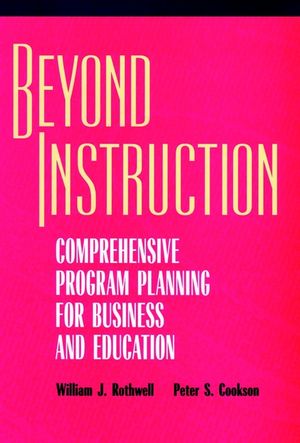Beyond Instruction: Comprehensive Program Planning for Business and EducationISBN: 978-0-7879-0328-2
Hardcover
304 pages
May 1997, Pfeiffer
 This is a Print-on-Demand title. It will be printed specifically to fill your order. Please allow an additional 10-15 days delivery time. The book is not returnable.
|
||||||
Preface.
The Authors.
CONCEPTUAL FOUNDATIONS.
The Meaning of Program Planning.
The Context for Comprehensive Program Planning.
EXERCISING PROFESSIONAL RESPONSIBILITY.
Working Effectively.
Magnifying the Roles of the Program Planner.
Articulating a Working Philosophy of Program Planning.
Enacting a Sense of Ethical Responsibility.
ENGAGING RELEVANT CONTEXTS.
Appraising the Organization's External Environment.
Appraising the Organization's Internal Environment.
Accommodating Participant Characteristics.
Assessing Needs and Negotiating Stakeholders' Interests.
DESIGNING THE PROGRAM.
Setting Goals and Objectives.
Determining Program Success.
Formulating the Instructional Design.
Designating Learning Procedures.
MANAGING ADMINISTRATIVE ASPECTS.
Recruiting and Retaining Program Participants.
Promoting and Marketing Programs.
Budgeting and Financing Programs.
Selecting, Supervising, Evaluating, and Developing Instructors.
Afterword.
Appendix One: Program Planning for Lifelong Education Competency Self-Assessment Form.
Appendix Two: Guidelines for Developing and Implementing a Code of Ethics for Adult Educators.
References.
Index.
The Authors.
CONCEPTUAL FOUNDATIONS.
The Meaning of Program Planning.
The Context for Comprehensive Program Planning.
EXERCISING PROFESSIONAL RESPONSIBILITY.
Working Effectively.
Magnifying the Roles of the Program Planner.
Articulating a Working Philosophy of Program Planning.
Enacting a Sense of Ethical Responsibility.
ENGAGING RELEVANT CONTEXTS.
Appraising the Organization's External Environment.
Appraising the Organization's Internal Environment.
Accommodating Participant Characteristics.
Assessing Needs and Negotiating Stakeholders' Interests.
DESIGNING THE PROGRAM.
Setting Goals and Objectives.
Determining Program Success.
Formulating the Instructional Design.
Designating Learning Procedures.
MANAGING ADMINISTRATIVE ASPECTS.
Recruiting and Retaining Program Participants.
Promoting and Marketing Programs.
Budgeting and Financing Programs.
Selecting, Supervising, Evaluating, and Developing Instructors.
Afterword.
Appendix One: Program Planning for Lifelong Education Competency Self-Assessment Form.
Appendix Two: Guidelines for Developing and Implementing a Code of Ethics for Adult Educators.
References.
Index.



